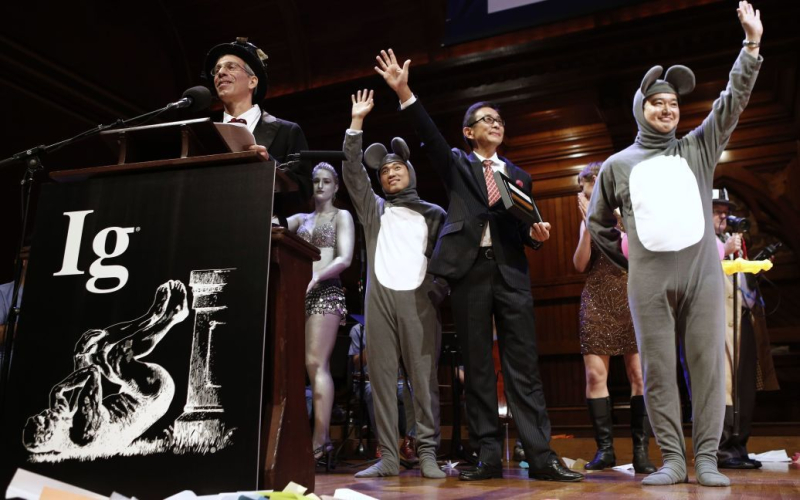Unusual achievements in the field of science are awarded annually with this alternative to the Nobel Prize.< /strong>
Ig Nobel Prizes go to extraordinary achievements in science that make people laugh first and then think. At the 33rd ceremony, Nobel laureates presented 10 Ig Nobel awards to scientists from 24 countries.
The Ig Nobel Prize in Chemistry and Geology was awarded to Polish researcher Jan Zalasiewicz for his attempt to explain why many scientists like to lick rocks. According to Ian, they do this to improve vision, not taste, because mineral particles are more visible on a wet surface than on a dry surface.
In the medical field, the prize was awarded to researchers from the United States, Canada, Macedonia, Iran and Vietnam for using human bodies to study whether the amount of hair in each of the two nostrils is the same.
The prize was awarded to a team of researchers from France, Great Britain, Malaysia and Finland for studying the sensations that arise in people who repeat the same word many, many, many, many, and many more times.
Mechanical Engineering
< p>The mechanical engineering prize went to scientists from India, China, Malaysia and the US for reviving dead spiders to use as mechanical grasping tools. According to scientists, a dead spider's legs naturally sit in a “closed” position like a clenched fist, but they can be pulled out and the grip can be opened by pressing.
A group of scientists from Spain studied the mental activity of people who can speak well by pronouncing words backwards. They recruited two men who could speak backwards and 18 other ordinary people for their experiments. Brain imaging of two men showed increased gray matter volume and improved functional connectivity (white matter) in key parts of the brain associated with language.
South Korea's Park Seung-min won a health prize for inventing the Stanford toilet. The device is designed to monitor your health by analyzing your waste using modern technologies, including computer vision, as well as an anal fingerprint sensor.
In the field of nutrition, the jury highlighted the experiment of the Japanese Homei Miyashita and Hiromi Kamura, dedicated to changing the taste of food when using electrified chopsticks and drinking straws. Nakamura said her recent research showed that it was possible to increase the saltiness of food by electrically stimulating the tongue.
A team of scientists led by Keiichi Tama showed that shaking the head, looking at the scenery outside the window and doodling in a notebook are signs of boredom .
Stanley Milgram, Leonard Beekman and Lawrence Berkowitz were awarded for “experiments on a city street to see how many passers-by stopped and looked up when they saw strangers looking up.” If you are interested in the result, then it is quite a lot – 65%.
Bieito Fernandez Castro assembled a team, got funding and measured how the sexual activity of anchovies affects the mixing of ocean water. More precisely, we are talking about biophysical turbulence that occurs during sexual activity of this species of fish.
Related topics:
More news

